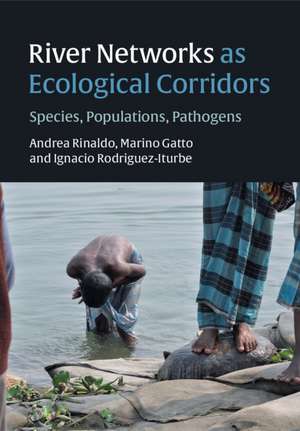River Networks as Ecological Corridors: Species, Populations, Pathogens
Autor Andrea Rinaldo, Marino Gatto, Ignacio Rodriguez-Iturbeen Limba Engleză Hardback – 21 oct 2020
Preț: 386.46 lei
Preț vechi: 420.07 lei
-8% Nou
Puncte Express: 580
Preț estimativ în valută:
73.96€ • 76.93$ • 61.06£
73.96€ • 76.93$ • 61.06£
Carte disponibilă
Livrare economică 22 martie-05 aprilie
Preluare comenzi: 021 569.72.76
Specificații
ISBN-13: 9781108477826
ISBN-10: 1108477828
Pagini: 454
Ilustrații: 68 b/w illus. 129 colour illus.
Dimensiuni: 183 x 260 x 26 mm
Greutate: 1.04 kg
Editura: Cambridge University Press
Colecția Cambridge University Press
Locul publicării:New York, United States
ISBN-10: 1108477828
Pagini: 454
Ilustrații: 68 b/w illus. 129 colour illus.
Dimensiuni: 183 x 260 x 26 mm
Greutate: 1.04 kg
Editura: Cambridge University Press
Colecția Cambridge University Press
Locul publicării:New York, United States
Cuprins
Preface; Acknowledgments; 1. Introduction; 2. Species; 3. Populations; 4. Waterborne disease; 5. Afterthoughts and outlook; Appendix A. Stability of dynamical systems and bifurcation analysis; Appendix B. Optimal channel networks and geomorphological statistical mechanics; Appendix C. Computational tools for waterborne disease spread; References; Index.
Recenzii
'A banquet of theoretical rigor, disciplinary integration, and insightful applications. Starting from a clear demonstration of the link between biodiversity patterns and processes to the physical template of our planet, and specifically river networks, the authors unleash a tour de force ranging from neutral theory to the spread of humans and pandemics to species invasions and biodiversity loss. Remarkable!' Pablo Marquet, Pontifical Catholic University of Chile
'This book is a brilliant marriage of theoretical and empirical exposition, and the most comprehensive integration available of the ecology and geomorphology of fluvial systems. The volume builds original exploration of some of the most fundamental issues in ecological theory upon an authoritative presentation of the mathematical foundations. The authors are unmatched in their expertise and scholarship in the subject, and the current volume is a magnificent capstone to their remarkable individual and collaborative contributions.' Simon A. Levin, Department of Ecology and Evolutionary Biology, Princeton University
'This monumental book is a wonderful corridor to 'run' through one of the most fascinating frontiers of research, the one linking water, landscapes, ecosystems, and societies. These important topics, here analyzed with the elegant tools of dynamical systems and statistical physics and with attention to field and laboratory observations, will inspire a new generation of environmental scientists.' Amilcare Porporato, Department of Civil and Environmental Engineering, Princeton University
'This novel approach takes ecohydrology into new territory. With a rich mixture of theory and practical science from both the field and the laboratory, the authors demonstrate how hydrological connectivity in the fluvial network provides the basis for an understanding of biodiversity, migration and the spread of disease in river systems. Spanning the widest range from the molecular via ecosystems to the world's largest river basins, the authors have assembled a broad research field into a single book that will excite and challenge students and researchers for a generation to come.' Tim Burt, Durham University
'This is the most insightful and powerful analysis of how river networks shape the complex ecological function of riparian corridors through controls on species dispersal, biological invasions, biodiversity patterns, and waterborne disease epidemics. A truly exceptional, comprehensive, and transformative account of theories, experiments, and applications with a wealth of new ideas. This is certain to become the most authoritative, inspiring, and illuminating book of reference in riparian ecohydrology!' Paolo D'Odorico, University of California, Berkeley
'… [an] innovative work … an in-depth look at the importance of riverine networks as corridors for the movement of various ecological conditions and populations.' K. R. Thompson, Choice
'This book is a brilliant marriage of theoretical and empirical exposition, and the most comprehensive integration available of the ecology and geomorphology of fluvial systems. The volume builds original exploration of some of the most fundamental issues in ecological theory upon an authoritative presentation of the mathematical foundations. The authors are unmatched in their expertise and scholarship in the subject, and the current volume is a magnificent capstone to their remarkable individual and collaborative contributions.' Simon A. Levin, Department of Ecology and Evolutionary Biology, Princeton University
'This monumental book is a wonderful corridor to 'run' through one of the most fascinating frontiers of research, the one linking water, landscapes, ecosystems, and societies. These important topics, here analyzed with the elegant tools of dynamical systems and statistical physics and with attention to field and laboratory observations, will inspire a new generation of environmental scientists.' Amilcare Porporato, Department of Civil and Environmental Engineering, Princeton University
'This novel approach takes ecohydrology into new territory. With a rich mixture of theory and practical science from both the field and the laboratory, the authors demonstrate how hydrological connectivity in the fluvial network provides the basis for an understanding of biodiversity, migration and the spread of disease in river systems. Spanning the widest range from the molecular via ecosystems to the world's largest river basins, the authors have assembled a broad research field into a single book that will excite and challenge students and researchers for a generation to come.' Tim Burt, Durham University
'This is the most insightful and powerful analysis of how river networks shape the complex ecological function of riparian corridors through controls on species dispersal, biological invasions, biodiversity patterns, and waterborne disease epidemics. A truly exceptional, comprehensive, and transformative account of theories, experiments, and applications with a wealth of new ideas. This is certain to become the most authoritative, inspiring, and illuminating book of reference in riparian ecohydrology!' Paolo D'Odorico, University of California, Berkeley
'… [an] innovative work … an in-depth look at the importance of riverine networks as corridors for the movement of various ecological conditions and populations.' K. R. Thompson, Choice
Notă biografică
Descriere
An overview of state-of-the-art research on how river environments impact biodiversity, species invasions, population dynamics, and the spread of waterborne disease.
